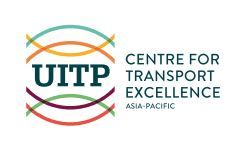

Governance of On-Demand Mobility Services
UITP Asia-Pacific Centre for Transport Excellence launched a research project on the Governance of On-Demand Mobility Services in May 2020.
This study provides practical insights and understanding to help organisations, especially Public Transport Authorities (PTAs) in managing the transition toward a more sustainable urban future that is less reliant on cars and other private vehicles.
Evolving Landscape of Urban Mobility
Mobility has undergone a profound transformation over the different industrial revolutions. The emergence of the rail and automobile industries addressed earlier socioeconomic needs, while the third industrial revolution introduced computer-aided transport. The fourth industrial revolution, marked by digitisation, has fundamentally altered societal behaviours and ushered in a new mobility era.
This digital revolution has facilitated the development of innovative transport solutions, attracting new entrants to the industry and changing user behaviour. On-demand mobility services (ODMS) are transportation services that are available at any time, i.e. on-demand. Traditionally, these services have been offered by taxis and private vehicles. However, with the advent of digital technology, ODMS are reshaping the traditional notions of public and private transport with the click of a mouse or the use of a smartphone application.
The continuously changing landscape of urban mobility systems, especially on-demand services, is posing a considerable challenge to many public transport authorities (PTAs) across the globe. Asian cities are particularly quick to adopt new technologies, as many face the issue of rapid urbanisation and urban development.
Where we stand now?
Aiming to understand the current state of play and market dynamics for it.
This report examines the current state of public transport systems and the impact of on-demand services on the urban mobility landscape and provides an overview of the difference types of governance approaches across ten Asia-Pacific cities. The project team conducted two online surveys with end-users of four Asia-Pacific cities, over fifty organisations from the public transport and on-demand mobility service sectors, two workshops, and interviews to collect the insights.
This study aims to provide practical understanding through various case studies and supporting data, it encourages PTAs to collaborate with new mobility service providers to complement public transport. It underscores the significance of employing regulatory and legislative tools to cultivate sustainable business models in the evolving mobility paradigm. Asia-Pacific countries present significant opportunities and challenges for on-demand mobility services, driven by fast changing markets and consumer behaviour. Entering this market requires careful consideration of local dynamics, adaptation to local needs, and a good understanding of the competitive ecosystem.
Dive deep through the research
6 key trends that are changing the urban mobility landscape of Asia-Pacific
After housing/space, transport is the second largest of the six pillars of the sharing economy (Owyang, 2014). The Asia-Pacific (APAC) region has seen a rapid rise in on-demand mobility services in recent years, driven by a range of technological and social trends. Six key leading trends that are disrupting the transport industry are discussed in this report to give you the glimpse of changing landscape.
10 in-depth case studies of Asia-Pacific cities to understand regulatory and policy frameworks related to on-demand services
- Singapore
- Shanghai, China
- Hong Kong, SAR China
- Kuala Lumpur, Malaysia
- Taipei, Taiwan
- Bangkok, Thailand
- Tokyo, Japan
- Melbourne, Australia
- Seoul, South Korea
- Delhi, India
2 online quantitative surveys sourcing data to validate the research study
- 4 cities user surveys data analysis – Singapore, Bangkok, Tokyo and Taipei
- 55 member organisation survey responses across the globe
2 workshops with authorities, operators and private players to collect responses on opportunities and challenges of the on-demand mobility services.
Work of Collaboration
The study is co-funded by the International Association of Public Transport (UITP) and the Land Transport Authority of Singapore (LTA).
Read more in our Executive Summary
Read the Full Report on MyLibrary(UITP members only).
For non-members who are interested in the Report, please contact [email protected]
Contact
UITP

Poornima SINGH
Manager for Research and Membership Services, UITP Asia-Pacific Centre for Transport Excellence[email protected]
become a member
Membership benefits




